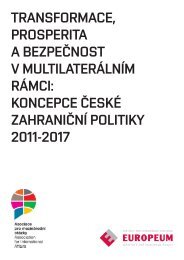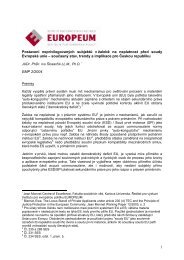eu constitutionalisation - EUROPEUM Institute for European Policy
eu constitutionalisation - EUROPEUM Institute for European Policy
eu constitutionalisation - EUROPEUM Institute for European Policy
Create successful ePaper yourself
Turn your PDF publications into a flip-book with our unique Google optimized e-Paper software.
Chapter 8: EU Development <strong>Policy</strong> in the Constitutional Treaty: a Step <strong>for</strong>ward?<strong>for</strong>eign policy, which is relatively short term and immediate in its concerns,and development policy, more long term and strategic in its approaches.Finding the balance and right space <strong>for</strong> each of the policies was not easy.There is also the on-going debate on coherence among different externalactions and increasing their effectiveness and visibility. Perceptions and priorities<strong>for</strong> EU external action differ in many areas: intergovernmental versussupranational approaches; member states which have sought to professionalizetheir development cooperation and focus on poverty eradication, versusother donors who link cooperation more closely to national interests; andmember states interested in the least developed countries, especially Africa,versus the new member states, with a focus on the near abroad⁹.The following quotation by ECDPM concludes the controversies faced bythe member states during the IGC:The key question is how the EU can enhance and maintain its development focuswhile contributing to world security, peace and prosperity. This implies recognizingthat, while there is no security without development, there is also no developmentwithout security. The fight against poverty takes on a political role and it becomescritical to clarify its status in the geopolitical debate of the <strong>European</strong> Union. It alsomeans that development needs to be discussed in the context of a broader policy <strong>for</strong>global security. This requires greater understanding on both sides of the debate – <strong>for</strong>eignaffairs and development – of how the two can work together but also of thelimitations and comparative advantages of each¹⁰.The outcome of the IGC is a compromise among differentiating opinionsachieved after months of negotiation. The issues which were the most controversialwere the structure of the <strong>European</strong> Commission or qualified majorityvoting. On the development cooperation side, despite the ef<strong>for</strong>ts of non-governmentalorganizations and development experts, debate on this subject didnot find enough consideration, being relevant only <strong>for</strong> these directly engagedin this issue. The campaign launched by the humanitarian organizations frommany <strong>European</strong> countries whose objective was to influence the decisions of theConvention and IGC only partly succeeded. Some of their preferences wereincorporated into the treaty text, some were omitted. The experts indicatedalso raised concerns over some apparently harmless provisions, which maysignificantly affect future EU relations with developing countries.Chapter 8: EU Development <strong>Policy</strong> in the Constitutional Treaty: a Step <strong>for</strong>ward?StructureThe provisions on development cooperation are placed mostly in Part IIIof the Treaty, under Title V: The Union’s external action, which consistsof 8 chapters:g Chapter 1: General provisionsg Chapter 2: CFSPg Chapter 3: Common Commercial <strong>Policy</strong>g Chapter 4: Cooperation with third countries and humanitarian aidg Chapter 5: Restrictive measuresg Chapter 6: International agreementsg Chapter 7: The Union’s relations with international organisations andthird countries and Union delegationsg Chapter 8: Implementation of the solidarity clauseHowever, significant provisions <strong>for</strong> development cooperation are includednot only in Part III relating to EU policies and its functioning, but also inPart I, among articles about the Union’s overall objectives.Solidarity as a common valueAccording to the Preamble, international solidarity is one of Europe’sunderlying vocations. It states that: Europe r<strong>eu</strong>nited after bitter experiences(…) wishes (…) to strive <strong>for</strong> peace, justice and solidarity throughout the world.The reference to that humanitarian concept is also included in Article I-2.Solidarity is recalled as one of the values prevailing in <strong>European</strong> society.The Union’s other values are respect <strong>for</strong> human dignity, liberty, democracy,equality, the rule of law and respect <strong>for</strong> human rights, pluralism, non-discrimination,tolerance, justice and equality between men and women.This reference to <strong>European</strong> common values constitutes an important recognitionof motives behind many <strong>European</strong> contacts with developing countries;however, in this aspect a stronger commitment to international solidarity as thebasis <strong>for</strong> the Union’s role in the world is absent. Such a statement would beimportant as the EU is the biggest provider of assistance worldwide. Globally,the <strong>European</strong> Community and its member states provide more than 55 % ofOfficial Development Aid, more than two-thirds of this as grants¹¹.9) See also: MACKIE, BASER, FREDERIKSEN and HASSE (2003), p. 9.10) Ibid., p.10.11) EUROPEAN COMMISSION (2001), EuropeAid Cooperation Office. Report on the implementation of the<strong>European</strong> Commission External Assistance, p. 4.282283








